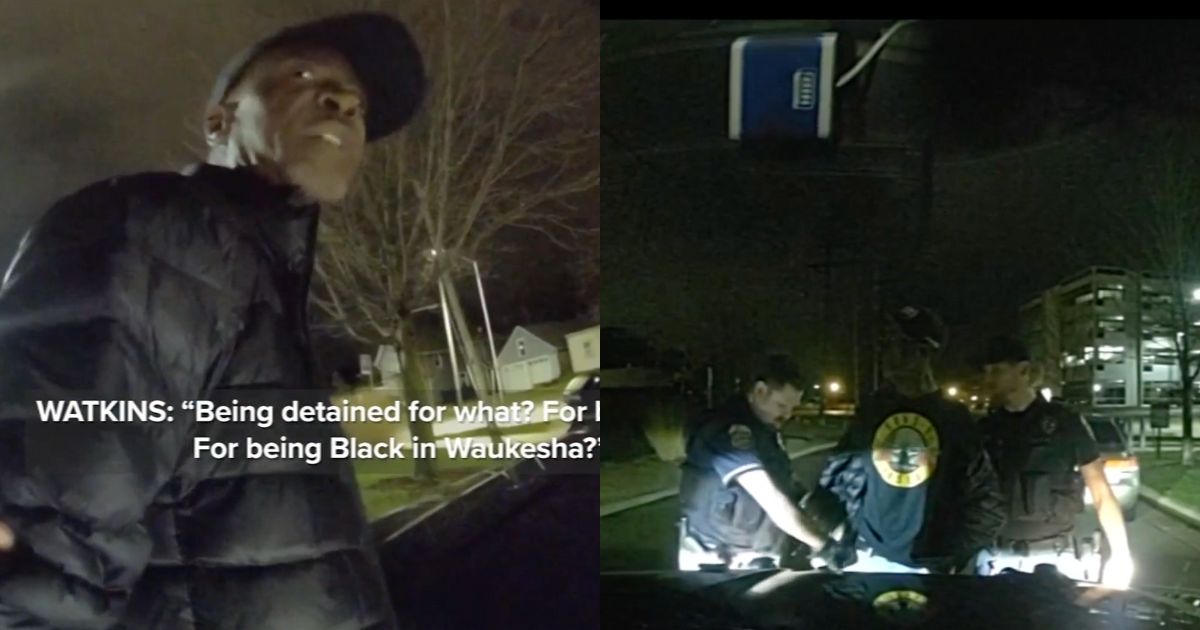During a time when America already stands divided based on race and ethnicity, another example of unnecessary escalation has come, and it is difficult not to view this as a case of racial profiling.
A black Milwaukee,Wisconsin, barber is suing Waukesha police officers. He has claimed that he was handcuffed, body-searched, and subjected to a K‑9 car sniff. All this while he decided to pull over to send an urgent text.
The whole incident was captured on bodycam footage and has sparked nationwide debate on racial profiling.
Jessie Watkins runs a busy barber business and serves almost 400 clients. To keep his private and professional life separate, he keeps two phones. On April 17, while driving, he needed to send an urgent text, and to avoid texting while driving, he pulled over in a no-parking zone.
He has explained so on the film. However, the officers immediately approached and questioned his presence. They were somehow surprised that Watkins was carrying two phones, even though he explained the situation to them.
Watkins has asked officers why he was being detained. One of the officers replied that everything that he was doing was suspicious and asked him several questions. Watkins kept a calm and compliant demeanor, yet he was asked to move out of the car and then was frisked by the officers.
Jessie Watkins says officers detained and searched him without probable cause after finding him parked in a no-parking zone. https://t.co/949eds3KKx
— TMJ4 News (@tmj4) July 25, 2025
Watkins requested to see their supervisor, and their request was repeatedly denied.
He protested: “You can’t search me, I know my rights.”
Still not satisfied, police then called in a K‑9 unit to conduct a drug sniff of his car. All the while, Watkins was in handcuffs for more than half an hour. After a thorough sniff, dogs didn’t find any drug or other paraphernalia, and Jessie was released without citation.
Watkins is now suing the police department on the claim of racial profiling. He says that the interaction has nothing to do with any suspicion, but it was all about the race, and he feels degraded and humiliated.
The Waukesha Police Department has also responded. The department has released a statement claiming officers made consensual contact due to safety concerns. They claim that Watkins’ car was illegally parked and was tinted so heavily that visibility inside was obstructed.
They also insist that the officers decided to make a contact just because of where he was and heavy tints on the window, and that it has nothing to do with the driver’s race.
The department has vowed that it will review the case internally and will address any potential bias.
Ugh. A double dose of racial profiling in Milwaukee. #Policereform now. https://t.co/s6Nf7HrSV5 @ACLUofWisconsin pic.twitter.com/fVRDwA3zv5
— Alexandra Ringe (@AlexandraRinge) March 8, 2017
However, Watkins’ attorney, William Sulton, has questioned the justification for the forced stop. He has argued that just because Watkins’ car was illegally parked should not have led to an arrest, frisking, or calling a K9 unit on him. He also said that if officers were concerned, they should have just asked him to move along, but to do the whole procedure a probable cause was needed that the police did not have. He also claimed that calling a K9 unit is not a routine practice, and police needed some cause or suspicion to do that, and they have not been able to prove any such situation.
Civil rights advocates and commentators have pointed towards a broader facet of the situation, calling it texting while black. If police keep placing doubts on Americans while doing their everyday activity, it will affect black Americans disproportionately.
Users on social media platforms have again called for reform
#HistoryLesson Starbucks racial profiling turned into a fatal police shooting of #DontreHamilton in Milwaukee 2014. This photo is of Dontre’s brother Nate @Justice4Dontre being arrested during protest. pic.twitter.com/wdZlH9CJQi
— Alida 🍯 (@honeynoir) April 19, 2018
The bodycam footage stands as critical evidence in this legal battle. It shows Watkins’ repeated requests for a supervisor and his consistent cooperation. At the same time, the body came of another officer who stood nearby showed to immediate
The case spotlights how ordinary routines like pulling over to text can spiral into civil rights disputes when racial bias intersects with law enforcement. Watkins’ lawsuit could influence policy changes. It could render changes around traffic stops, police transparency, and community accountability.













